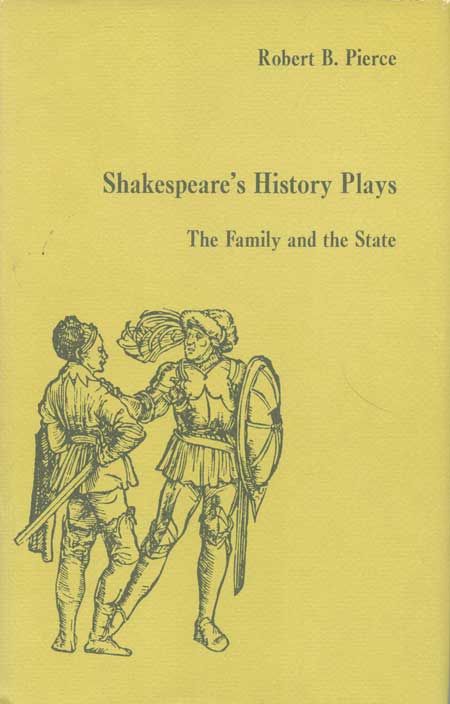| click here to read the full text of the book | leave / read comments and critiques of the book |

Shakespeare’s History Plays
The Family and the State
Robert B. Pierce
“adds a significant new focus to an understanding of these plays.” —Renaissance Quarterly
The concept of the family as a microcosm of the state dates back to antiquity. It was revived in the Renaissance, when it became a common sentiment in the literature of Elizabethan England and provided William Shakespeare with a public basis for his art.
Robert B. Pierce systematically examines the nine history plays of the 1590s in the approximate sequence of their composition. He discovers in them a constant elaboration and rich development of the correspondence between the family and the state into an ever more subtle and effective dramatic technique.
Through a careful analysis of the language, characterization, and plots of the chronicles, Pierce demonstrates how the family served as an analogue of those grave events that marked the turbulent reign of King John and the subsequent terrible century of civil strife and wars with the French that haunted the imaginations of Englishmen more than a hundred years later. At times, he finds, Shakespeare depicts the family as a miniature of the kingdom, and the life of the family becomes a direct or ironic comment on the larger life of the commonwealth. At others, the family is inextricably bound up in a political situation by means of characters who are portrayed both in their public roles and as members of their families.
No dramatist treating of those persons and events that are the stuff of the chronicles could avoid depicting the family; for kings and princes are necessarily fathers and sons, husbands and brothers. But Shakespeare’s special contribution is to make the language and episodes of family life relate closely to the political themes that informed his drama—themes that, for his audience, were not mere abstractions but real issues involving the ever present danger of drastic disruption of the established order. Marriage and the relationship between father and son are the materials of a highly personal drama. By exploiting the correspondence between the family and the state recognized and accepted by his audience, Shakespeare, in plays shaped by Tudor political ideas, used these personal, familiar, and familial elements to bring a special immediacy to the rise and fall of kingdoms and kings.
Robert B. Pierce is associate professor of English at Oberlin College.
| 1971 261 pp. | This title is no longer available in a traditional print edition. Click here for free access to the book’s full text. |

